Linux下编译Eclipse Paho库采用MQTT协议连接MQTT服务器
一、Eclipse Paho介绍
Eclipse Paho 是一个开源项目,由 Eclipse Foundation 主持,提供可靠的开源实现来处理 MQTT(Message Queuing Telemetry Transport)协议以及其他与物联网 (IoT) 相关的协议。MQTT 是一种轻量级的发布/订阅消息传输协议,专为具有低带宽和不可靠网络连接的设备设计。Paho 提供了多种语言的客户端库,使得开发者可以在各种平台上开发基于 MQTT 协议的应用程序。
1.1 主要特点
-
跨平台支持:Paho 支持多种操作系统和硬件平台,包括Windows、Linux、macOS 以及嵌入式系统。
-
多语言实现:Paho 客户端库提供了多种编程语言的选择,如 C、C++、Java 和 Python 等。
-
可靠性:Paho 能够在各种网络条件下可靠地工作,包括高延迟、丢包和间歇性连接等。
-
安全性:Paho 支持 TLS/SSL 加密通信,以保证数据的安全传输。
-
灵活性:除了基本的 MQTT 协议实现之外,Paho 还允许扩展和定制以适应特定的需求。
1.2 Eclipse Paho MQTT C客户端库特点
Eclipse Paho MQTT支持多种语言,其中的C客户端库是一个用于实现MQTT协议客户端的开源C语言库。
- 跨平台支持:该库设计为可移植的,支持多种操作系统和硬件平台,包括Linux、Windows、MacOS以及嵌入式系统。
- 易于集成:库的设计使得它易于集成到现有的C或C++项目中,为开发者提供了简单而强大的API来构建MQTT客户端。
- 灵活的连接选项:支持TLS/SSL加密的MQTT连接,提供安全的通信通道。同时,支持QoS(服务质量)级别0(最多一次)、1(至少一次)和2(仅一次)的消息传递,确保消息传递的可靠性。
- 异步操作:大多数库操作都是异步的,允许应用程序在等待网络响应时继续执行其他任务,提高了应用程序的响应性和效率。
- 客户端和服务器消息处理:库支持客户端到服务器的消息发布(PUBLISH)以及从服务器到客户端的消息订阅(SUBSCRIBE)和接收(RECEIVE)。
- 持久会话和遗嘱消息:支持持久会话,即使客户端断开连接也能保持订阅和QoS状态。同时,可以设置遗嘱消息,在客户端异常断开时发送特定消息。
- 回调函数:通过提供回调函数来处理连接、断开连接、消息接收等事件,使得事件处理逻辑更加灵活。
二、Eclipse Paho源码下载
官网地址:https://projects.eclipse.org/projects/iot.paho/downloads
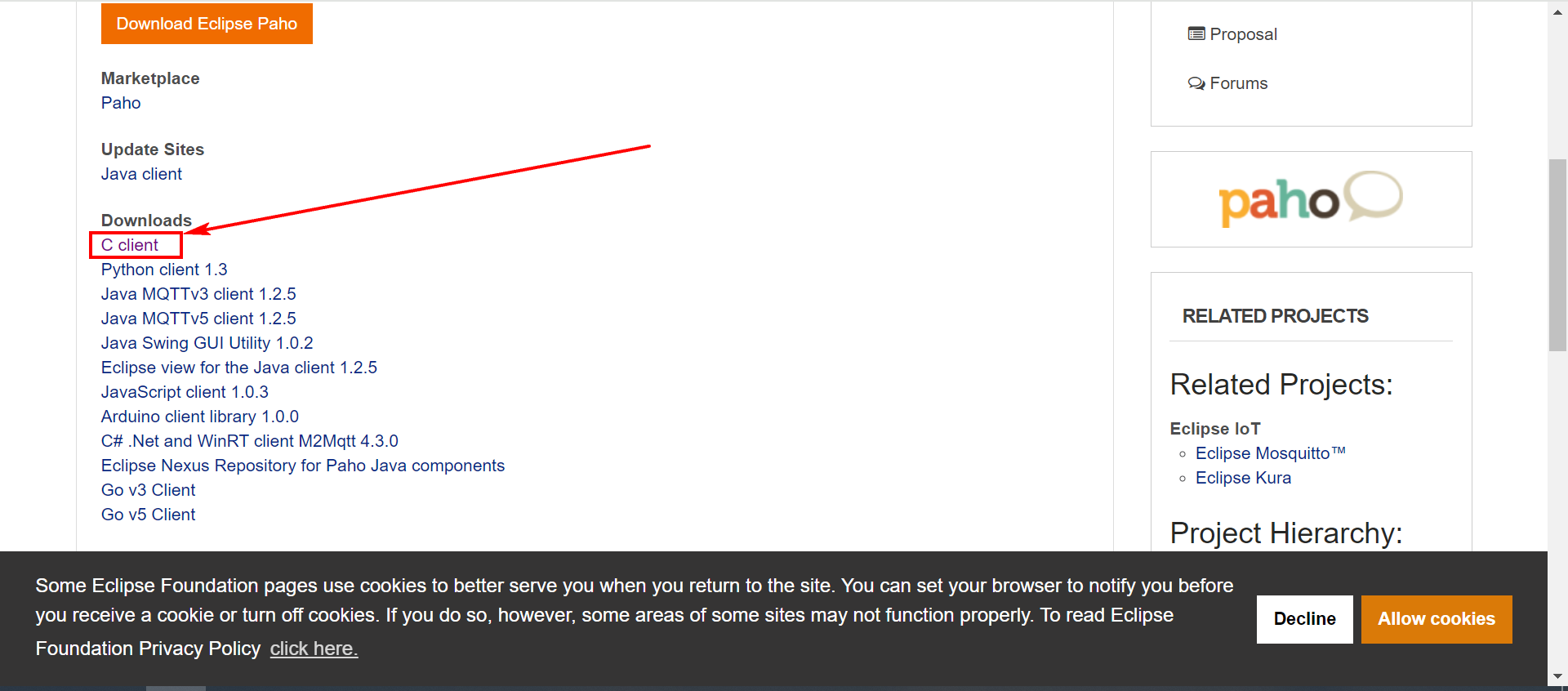
库的下载地址:https://github.com/eclipse/paho.mqtt.c/releases
在页面上可以看到源码下载和编译好的库文件下载。
提供了Linux下、Windows下编译好的库文件,可以直接使用。 如果你现在嵌入式平台上、其他平台上使用,那需要自己下载源码进行编译,使用。
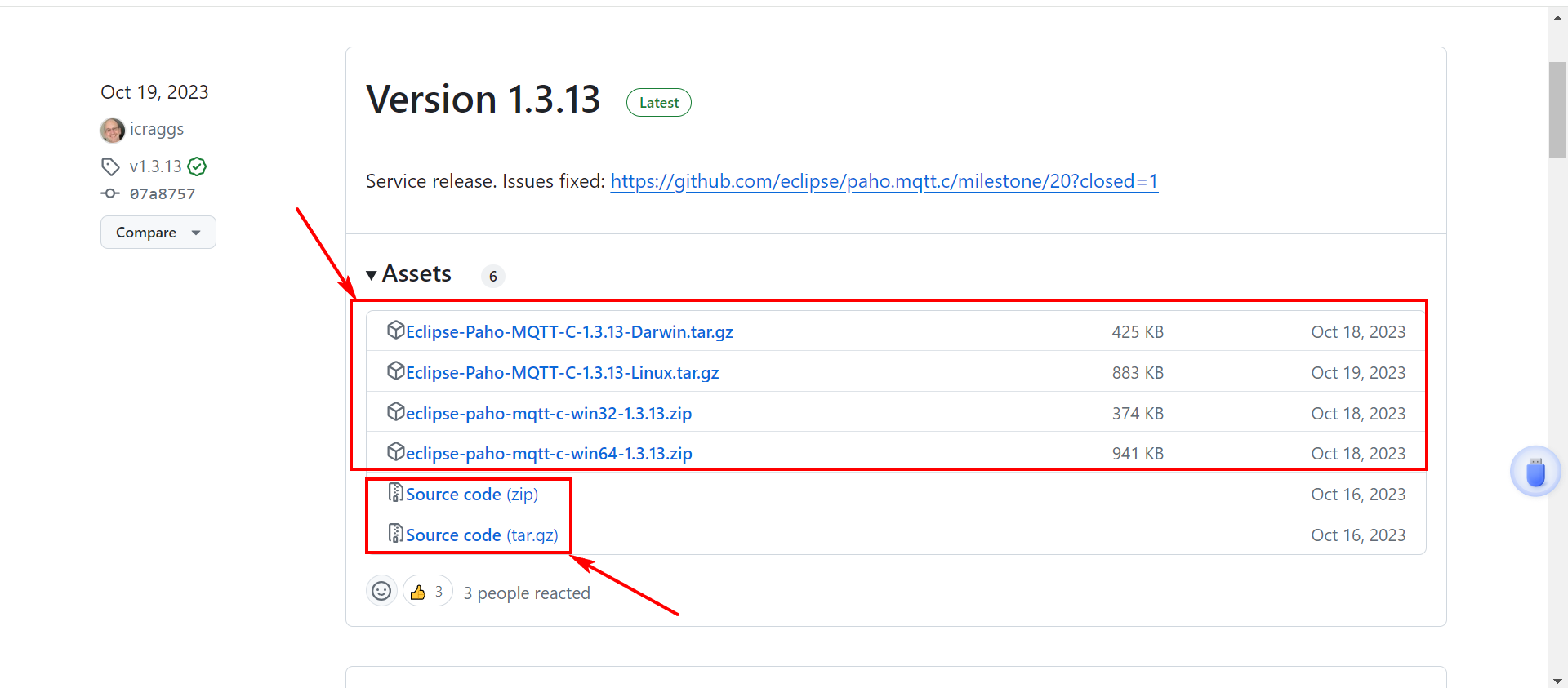
三、编译Eclipse Paho库文件
3.1 下载编译openSSL
如果要支持ssl加密的支持,那就需要先编译安装 openSSL。
下载地址:https://codeload.github.com/openssl/openssl/tar.gz/refs/tags/OpenSSL_1_1_1g
编译步骤:
1、解压缩
tar zxf openssl-OpenSSL_1_1_1g.tar.gz
2、进入目录,并配置输出目录和编译器
cd openssl-OpenSSL_1_1_1g/
./config no-asm shared no-async --prefix=`pwd`/ssl_result
如果是交叉编译器,可以指定 --cross-compile-prefix=arm-linux-。
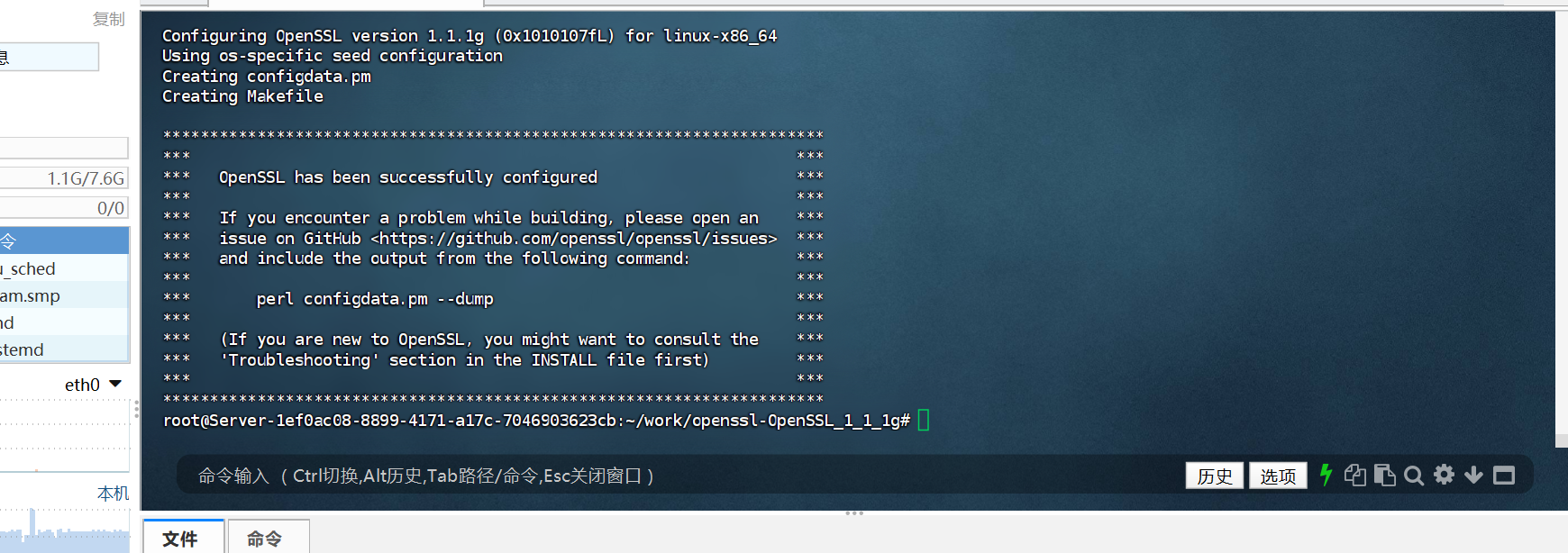
3、执行下面命令,删除Makefile文件的 -m64
(如果指定了交叉编译器)
sed -i 's/-m64//' Makefile
执行后,可以避免出现这个编译错误:arm-linux-: error: unrecognized command line option ‘-m64’
4、编译、安装
make && make install
成功编译后,在openssl-OpenSSL_1_1_1g/目录会生成一个ssl_result目录,可以看到里面生成的库.
编译过程中。
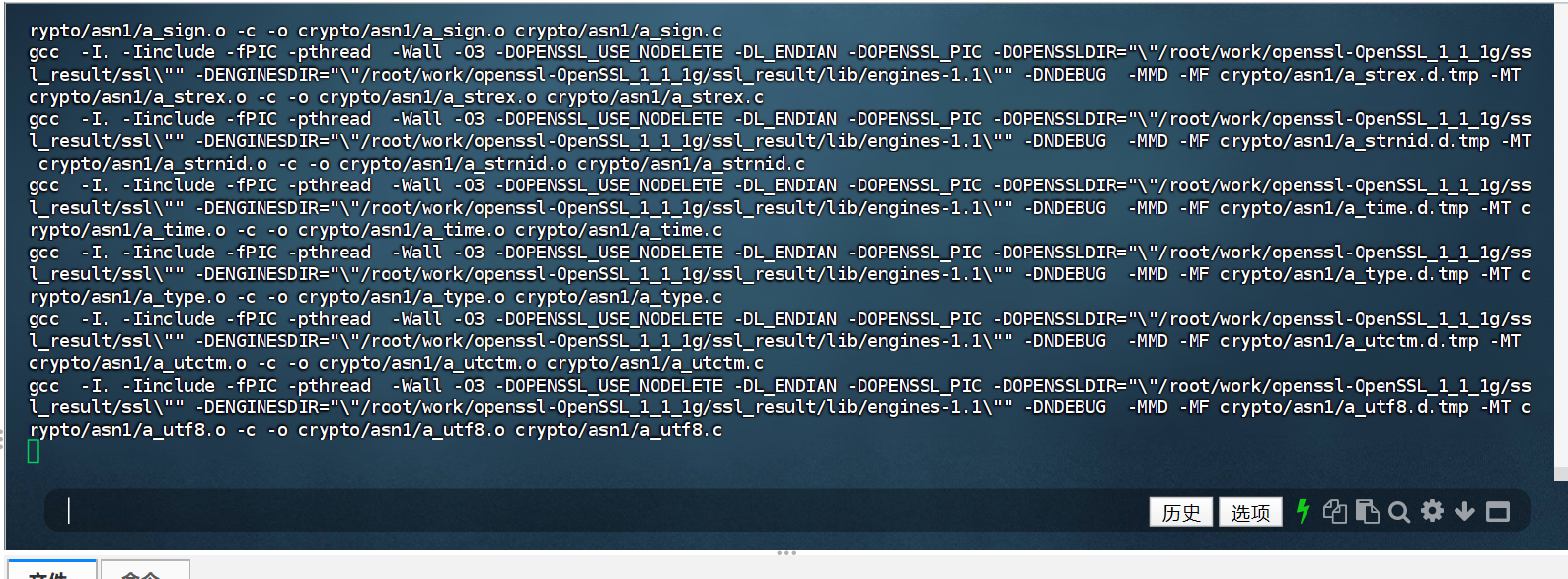
编译完成。

3.2 paho.mqtt.c 编译
当前下载的是 paho.mqtt.c-1.3.13.tar.gz
下载地址:https://github.com/eclipse/paho.mqtt.c/archive/refs/tags/v1.3.13.tar.gz
wget https://github.com/eclipse/paho.mqtt.c/archive/refs/tags/v1.3.13.tar.gz
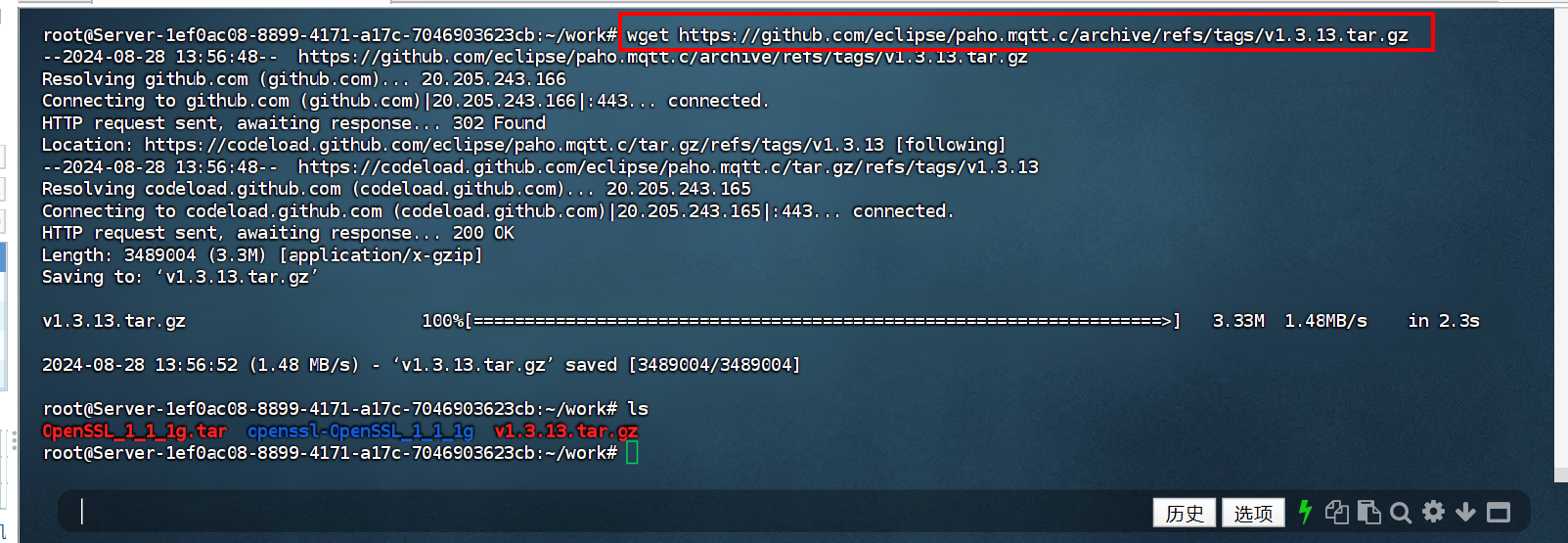
编译步骤:
1、解压缩,创建要安装目录paho.mqtt.c_result
tar zxf paho.mqtt.c-1.3.13.tar.gz
mkdir paho.mqtt.c_result/bin -p
mkdir paho.mqtt.c_result/include -p
mkdir paho.mqtt.c_result/lib -p
mkdir paho.mqtt.c_result/share/man/man1 -p
2、进入目录,交叉编译
cd paho.mqtt.c-1.3.13/
make CC=gcc CFLAGS:="-I `pwd`/../ssl_result/include" LDFLAGS:="-L `pwd`/../ssl_result/lib"
编译过程中:
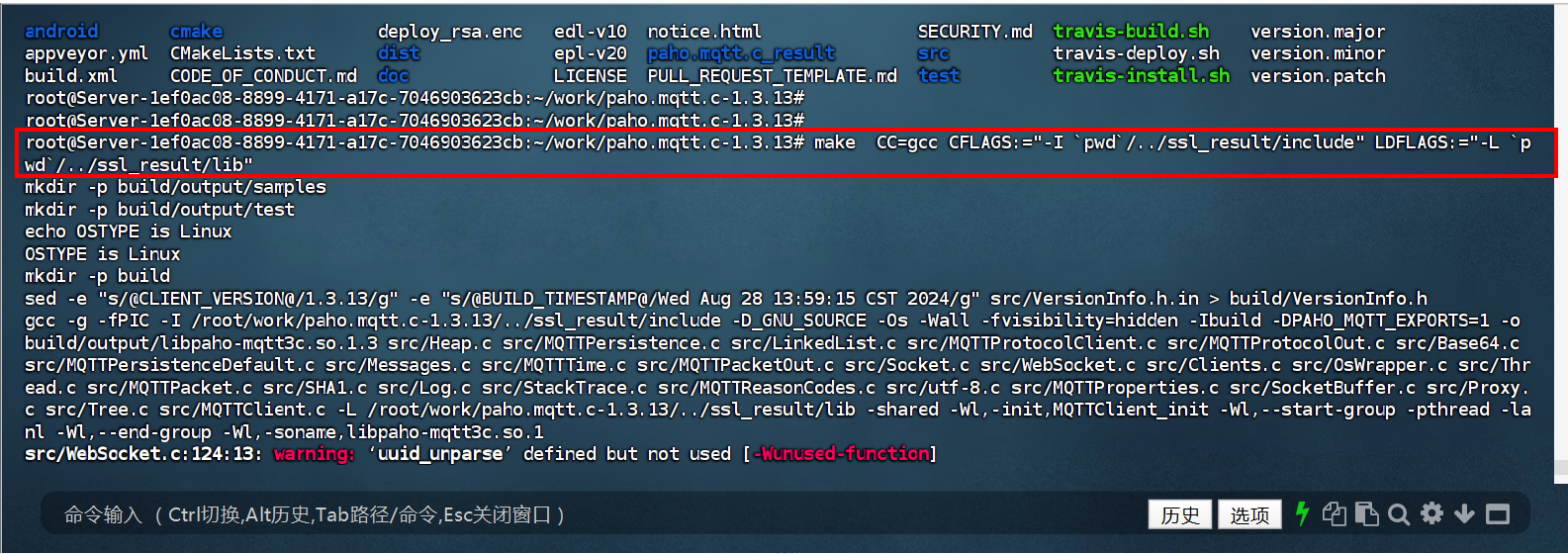
编译完成:

如果是交叉编译需要指定交叉编译器完整名字:
cd paho.mqtt.c-1.3.13/
make CC=arm-linux-gcc CFLAGS:="-I `pwd`/../ssl_result/include" LDFLAGS:="-L `pwd`/../ssl_result/lib"
参数介绍:
CFLAGS:=“-I `pwd`/…/ssl_result/include”:指定前面编译的 openssl 的头文件;
LDFLAGS:=“-L `pwd`/…/ssl_result/lib”:指定前面编译的 openssl 的库文件路径;
3、make install,安装编译结果
make install prefix=`pwd`/../paho.mqtt.c_result
prefix=`pwd`/…/paho.mqtt.c_result :指定安装目录路径;
编译完成后,会生成目录。
3.3 paho.mqtt.cpp 编译
当前下载的是paho.mqtt.cpp-1.3.2.tar.gz
下载地址:https://github.com/eclipse/paho.mqtt.cpp/archive/refs/tags/v1.3.2.tar.gz
如果你下载的版本跟我的一样,可以使用下面的脚本进行编译。
编译之前,先创建一个脚本文件,名字为paho.mqtt.cpp_install,将下面代码粘贴进去保存。
#! /bin/sh
RESULT_DIR=$(pwd)/result_dir
RESULT_SSL=${RESULT_DIR}/ssl_result
RESULT_MQTT_C=${RESULT_DIR}/paho.mqtt.c_result
RESULT_MQTT_CPP=${RESULT_DIR}/paho.mqtt.cpp_result
CROSSS_COMPILE_TOOL=arm-linux- #如果你是需要交叉编译
编译步骤:
1、解压缩
tar zxf paho.mqtt.cpp-1.3.2.tar.gz
2、进入目录
cd paho.mqtt.cpp-1.3.2/
3、执行 cmake
mkdir build_arm
cd build_arm
编译不需要 openssl 的库
cmake .. -DCMAKE_CXX_COMPILER=${CROSSS_COMPILE_TOOL}g++ \
-DCMAKE_INSTALL_PREFIX=${RESULT_MQTT_CPP} \
-DPAHO_MQTT_C_LIBRARIES=${RESULT_MQTT_C}/lib/libpaho-mqtt3a.so \
-DPAHO_MQTT_C_INCLUDE_DIRS=${RESULT_MQTT_C}/include \
-DPAHO_WITH_SSL=OFF \
-DCMAKE_CXX_FLAGS="-std=gnu++11 -mcpu=cortex-a53"
说明:如果你在PC机编译目标是PC机本身使用,-mcpu=cortex-a53 就不用写。 如果交叉编译的目标是嵌入式芯片,就如实写构架。
编译带有 openssl 的库
cmake .. -DCMAKE_CXX_COMPILER=${CROSSS_COMPILE_TOOL}g++ \
-DCMAKE_INSTALL_PREFIX=${RESULT_MQTT_CPP} \
-DPAHO_MQTT_C_LIBRARIES=${RESULT_MQTT_C}/lib/libpaho-mqtt3a.so \
-DPAHO_MQTT_C_INCLUDE_DIRS=${RESULT_MQTT_C}/include \
-DOPENSSL_SSL_LIBRARY=${RESULT_SSL}/lib/libssl.so \
-DOPENSSL_INCLUDE_DIR=${RESULT_SSL}/include \
-DOPENSSL_CRYPTO_LIBRARY=${RESULT_SSL}/lib/libcrypto.so \
-DCMAKE_CXX_FLAGS="-std=gnu++11 -mcpu=cortex-a53"
说明:如果你在PC机编译目标是PC机本身使用,-mcpu=cortex-a53 就不用写。 如果交叉编译的目标是嵌入式芯片,就如实写构架。
4、编译
make && make install
5、将下载的源码包 paho.mqtt.cpp-1.3.2.tar.gz 和 上面保存的脚本paho.mqtt.cpp_install 放到同一目录,并且将前面编译好的openssl库、paho.mqtt.c库放在脚本指定的结果目录,当前是放到 result_dir 目录的。
6、执行./paho.mqtt.cpp_install.sh 编译,编译完成后,在result_dir目录下会生成一个名为paho.mqtt.cpp_result的目录。
四、代码案例
4.1 订阅—async_subscribe.cpp
这是使用了 libpaho-mqttpp3.so 进行订阅消息的源码,源码路径在源码的这个路径:paho.mqtt.cpp-1.3.2/src/samples/async_subscribe.cpp,只更改了服务器地址。
完整代码如下:
#include <iostream>
#include <cstdlib>
#include <string>
#include <cstring>
#include <cctype>
#include <thread>
#include <chrono>
#include "mqtt/async_client.h"
const std::string SERVER_ADDRESS("117.78.5.125:1883");
const std::string CLIENT_ID("paho_cpp_async_subcribe");
const std::string TOPIC("hello");
const intQOS = 1;
const intN_RETRY_ATTEMPTS = 5;
/
// Callbacks for the success or failures of requested actions.
// This could be used to initiate further action, but here we just log the
// results to the console.
class action_listener : public virtual mqtt::iaction_listener
{
std::string name_;
void on_failure(const mqtt::token& tok) override {
std::cout << name_ << " failure";
if (tok.get_message_id() != 0)
std::cout << " for token: [" << tok.get_message_id() << "]" << std::endl;
std::cout << std::endl;
}
void on_success(const mqtt::token& tok) override {
std::cout << name_ << " success";
if (tok.get_message_id() != 0)
std::cout << " for token: [" << tok.get_message_id() << "]" << std::endl;
auto top = tok.get_topics();
if (top && !top->empty())
std::cout << "\ttoken topic: '" << (*top)[0] << "', ..." << std::endl;
std::cout << std::endl;
}
public:
action_listener(const std::string& name) : name_(name) {}
};
/
/**
* Local callback & listener class for use with the client connection.
* This is primarily intended to receive messages, but it will also monitor
* the connection to the broker. If the connection is lost, it will attempt
* to restore the connection and re-subscribe to the topic.
*/
class callback : public virtual mqtt::callback,
public virtual mqtt::iaction_listener
{
// Counter for the number of connection retries
int nretry_;
// The MQTT client
mqtt::async_client& cli_;
// Options to use if we need to reconnect
mqtt::connect_options& connOpts_;
// An action listener to display the result of actions.
action_listener subListener_;
// This deomonstrates manually reconnecting to the broker by calling
// connect() again. This is a possibility for an application that keeps
// a copy of it's original connect_options, or if the app wants to
// reconnect with different options.
// Another way this can be done manually, if using the same options, is
// to just call the async_client::reconnect() method.
void reconnect() {
std::this_thread::sleep_for(std::chrono::milliseconds(2500));
try {
cli_.connect(connOpts_, nullptr, *this);
}
catch (const mqtt::exception& exc) {
std::cerr << "Error: " << exc.what() << std::endl;
exit(1);
}
}
// Re-connection failure
void on_failure(const mqtt::token& tok) override {
std::cout << "Connection attempt failed" << std::endl;
if (++nretry_ > N_RETRY_ATTEMPTS)
exit(1);
reconnect();
}
// (Re)connection success
// Either this or connected() can be used for callbacks.
void on_success(const mqtt::token& tok) override {}
// (Re)connection success
void connected(const std::string& cause) override {
std::cout << "\nConnection success" << std::endl;
std::cout << "\nSubscribing to topic '" << TOPIC << "'\n"
<< "\tfor client " << CLIENT_ID
<< " using QoS" << QOS << "\n"
<< "\nPress Q<Enter> to quit\n" << std::endl;
cli_.subscribe(TOPIC, QOS, nullptr, subListener_);
}
// Callback for when the connection is lost.
// This will initiate the attempt to manually reconnect.
void connection_lost(const std::string& cause) override {
std::cout << "\nConnection lost" << std::endl;
if (!cause.empty())
std::cout << "\tcause: " << cause << std::endl;
std::cout << "Reconnecting..." << std::endl;
nretry_ = 0;
reconnect();
}
// Callback for when a message arrives.
void message_arrived(mqtt::const_message_ptr msg) override {
std::cout << "Message arrived" << std::endl;
std::cout << "\ttopic: '" << msg->get_topic() << "'" << std::endl;
std::cout << "\tpayload: '" << msg->to_string() << "'\n" << std::endl;
}
void delivery_complete(mqtt::delivery_token_ptr token) override {}
public:
callback(mqtt::async_client& cli, mqtt::connect_options& connOpts)
: nretry_(0), cli_(cli), connOpts_(connOpts), subListener_("Subscription") {}
};
/
int main(int argc, char* argv[])
{
// A subscriber often wants the server to remember its messages when its
// disconnected. In that case, it needs a unique ClientID and a
// non-clean session.
mqtt::async_client cli(SERVER_ADDRESS, CLIENT_ID);
mqtt::connect_options connOpts;
connOpts.set_clean_session(false);
// Install the callback(s) before connecting.
callback cb(cli, connOpts);
cli.set_callback(cb);
// Start the connection.
// When completed, the callback will subscribe to topic.
try {
std::cout << "Connecting to the MQTT server..." << std::flush;
cli.connect(connOpts, nullptr, cb);
}
catch (const mqtt::exception& exc) {
std::cerr << "\nERROR: Unable to connect to MQTT server: '"
<< SERVER_ADDRESS << "'" << exc << std::endl;
return 1;
}
// Just block till user tells us to quit.
while (std::tolower(std::cin.get()) != 'q')
;
// Disconnect
try {
std::cout << "\nDisconnecting from the MQTT server..." << std::flush;
cli.disconnect()->wait();
std::cout << "OK" << std::endl;
}
catch (const mqtt::exception& exc) {
std::cerr << exc << std::endl;
return 1;
}
return 0;
}
编译指令:
g++ async_subscribe.cpp -I result_dir/paho.mqtt.cpp_result/include/ -I result_dir/paho.mqtt.c_result/include/ -L result_dir/paho.mqtt.cpp_result/lib/ -L result_dir/paho.mqtt.c_result/lib/ -l paho-mqttpp3 -l paho-mqtt3a
4.2 发布——async_publish.cpp
这是使用了 libpaho-mqttpp3.so 进行发布消息的源码,源码路径在源码的这个路径:paho.mqtt.cpp-1.3.2/src/samples/async_publish.cpp,只更改了服务器地址。
完整代码如下:
#include <iostream>
#include <cstdlib>
#include <string>
#include <thread>
#include <atomic>
#include <chrono>
#include <cstring>
#include "mqtt/async_client.h"
using namespace std;
const string DFLT_SERVER_ADDRESS{ "117.78.5.125:1883" };
const string CLIENT_ID{ "paho_cpp_async_publish" };
const string PERSIST_DIR{ "./persist" };
const string TOPIC { "hello" };
const char* PAYLOAD1 = "Hello World!";
const char* PAYLOAD2 = "Hi there!";
const char* PAYLOAD3 = "Is anyone listening?";
const char* PAYLOAD4 = "Someone is always listening.";
const char* LWT_PAYLOAD = "Last will and testament.";
const int QOS = 1;
const auto TIMEOUT = std::chrono::seconds(10);
/
/**
* A callback class for use with the main MQTT client.
*/
class callback : public virtual mqtt::callback
{
public:
void connection_lost(const string& cause) override {
cout << "\nConnection lost" << endl;
if (!cause.empty())
cout << "\tcause: " << cause << endl;
}
void delivery_complete(mqtt::delivery_token_ptr tok) override {
cout << "\tDelivery complete for token: "
<< (tok ? tok->get_message_id() : -1) << endl;
}
};
/
/**
* A base action listener.
*/
class action_listener : public virtual mqtt::iaction_listener
{
protected:
void on_failure(const mqtt::token& tok) override {
cout << "\tListener failure for token: "
<< tok.get_message_id() << endl;
}
void on_success(const mqtt::token& tok) override {
cout << "\tListener success for token: "
<< tok.get_message_id() << endl;
}
};
/
/**
* A derived action listener for publish events.
*/
class delivery_action_listener : public action_listener
{
atomic<bool> done_;
void on_failure(const mqtt::token& tok) override {
action_listener::on_failure(tok);
done_ = true;
}
void on_success(const mqtt::token& tok) override {
action_listener::on_success(tok);
done_ = true;
}
public:
delivery_action_listener() : done_(false) {}
bool is_done() const { return done_; }
};
/
int main(int argc, char* argv[])
{
// A client that just publishes normally doesn't need a persistent
// session or Client ID unless it's using persistence, then the local
// library requires an ID to identify the persistence files.
stringaddress = (argc > 1) ? string(argv[1]) : DFLT_SERVER_ADDRESS,
clientID = (argc > 2) ? string(argv[2]) : CLIENT_ID;
cout << "Initializing for server '" << address << "'..." << endl;
mqtt::async_client client(address, clientID, PERSIST_DIR);
callback cb;
client.set_callback(cb);
auto connOpts = mqtt::connect_options_builder()
.clean_session()
.will(mqtt::message(TOPIC, LWT_PAYLOAD, strlen(LWT_PAYLOAD), QOS, false))
.finalize();
cout << " ...OK" << endl;
try {
cout << "\nConnecting..." << endl;
mqtt::token_ptr conntok = client.connect(connOpts);
cout << "Waiting for the connection..." << endl;
conntok->wait();
cout << " ...OK" << endl;
// First use a message pointer.
cout << "\nSending message..." << endl;
mqtt::message_ptr pubmsg = mqtt::make_message(TOPIC, PAYLOAD1);
pubmsg->set_qos(QOS);
client.publish(pubmsg)->wait_for(TIMEOUT);
cout << " ...OK" << endl;
// Now try with itemized publish.
cout << "\nSending next message..." << endl;
mqtt::delivery_token_ptr pubtok;
pubtok = client.publish(TOPIC, PAYLOAD2, strlen(PAYLOAD2), QOS, false);
cout << " ...with token: " << pubtok->get_message_id() << endl;
cout << " ...for message with " << pubtok->get_message()->get_payload().size()
<< " bytes" << endl;
pubtok->wait_for(TIMEOUT);
cout << " ...OK" << endl;
// Now try with a listener
cout << "\nSending next message..." << endl;
action_listener listener;
pubmsg = mqtt::make_message(TOPIC, PAYLOAD3);
pubtok = client.publish(pubmsg, nullptr, listener);
pubtok->wait();
cout << " ...OK" << endl;
// Finally try with a listener, but no token
cout << "\nSending final message..." << endl;
delivery_action_listener deliveryListener;
pubmsg = mqtt::make_message(TOPIC, PAYLOAD4);
client.publish(pubmsg, nullptr, deliveryListener);
while (!deliveryListener.is_done()) {
this_thread::sleep_for(std::chrono::milliseconds(100));
}
cout << "OK" << endl;
// Double check that there are no pending tokens
auto toks = client.get_pending_delivery_tokens();
if (!toks.empty())
cout << "Error: There are pending delivery tokens!" << endl;
// Disconnect
cout << "\nDisconnecting..." << endl;
client.disconnect()->wait();
cout << " ...OK" << endl;
}
catch (const mqtt::exception& exc) {
cerr << exc.what() << endl;
return 1;
}
return 0;
}
编译指令:
g++ async_publish.cpp -I result_dir/paho.mqtt.cpp_result/include/ -I result_dir/paho.mqtt.c_result/include/ -L result_dir/paho.mqtt.cpp_result/lib/ -L result_dir/paho.mqtt.c_result/lib/ -l paho-mqttpp3 -l paho-mqtt3a -o async_publish
原文地址:https://blog.csdn.net/xiaolong1126626497/article/details/142778832
免责声明:本站文章内容转载自网络资源,如本站内容侵犯了原著者的合法权益,可联系本站删除。更多内容请关注自学内容网(zxcms.com)!
